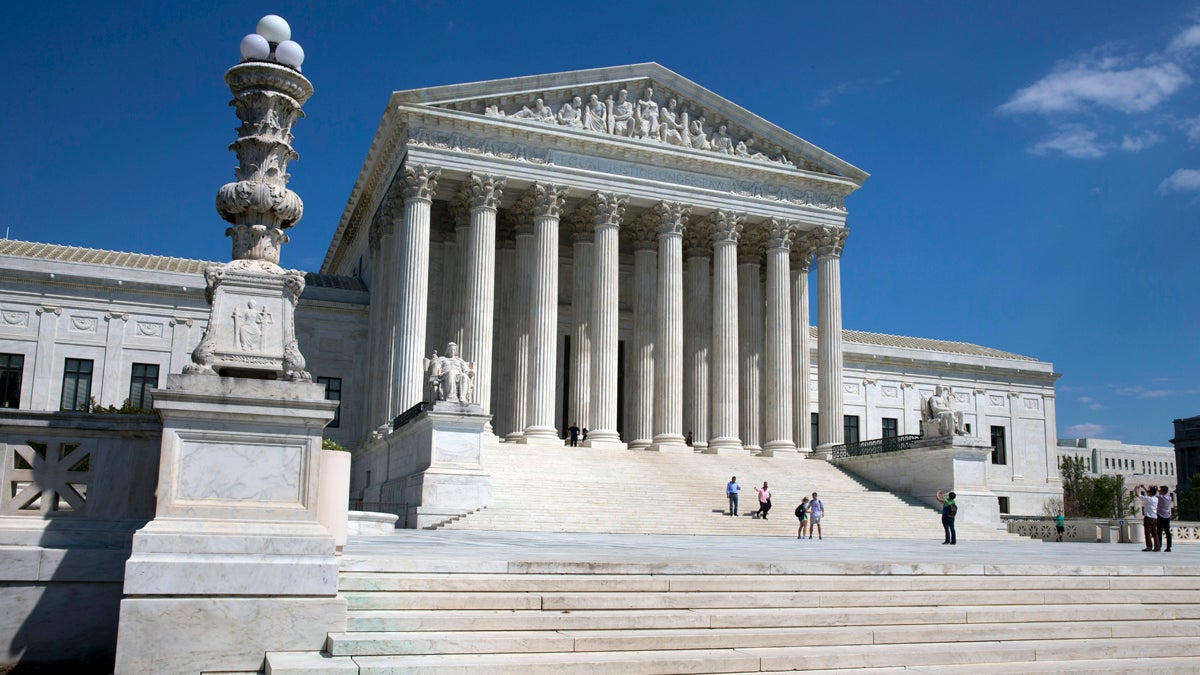The Supreme Court intones, ‘Let us pray’

A narrowly divided Supreme Court upheld decidedly Christian prayers at the start of local council meetings on Monday, declaring them in line with long national traditions though the country has grown more religiously diverse. (Jacquelyn Martin/AP Photo)
How predictable it was that they’d further thin the wall that separates church and state, by favoring the Christian church.
To the surprise of absolutely nobody who inhabits this temporal world, the Supreme Court’s conservative majority decreed on Monday that if you don’t like hearing Jesus prayers at your town council meetings, well, that’s too bad for you.
How predictable it was that they’d further thin the wall that separates church and state, by favoring the Christian church. A town in upstate New York, over a 15-year span, had opened virtually all of its public council sessions with guest Christian chaplains blessing the proceedings and its citizen attendants (a typical example: “We acknowledge the saving sacrifice of Jesus Christ on the cross”), but the court’s Republican bloc didn’t understand why any non-believers in the audience could possibly object to that.
And so, in Town of Greece v. Galloway, Anthony Kennedy essentially wrote that dissenting citizens should simply get with the program: “By inviting ministers to serve as chaplain for the month…the town is acknowledging the central place that religion and religious institutions hold in the lives of those present,” and if citizens who don’t believe in Jesus feel that the prayers “make them feel excluded and disrespected,” then tough. Because, after all, “adults often encounter speech they find disagreeable.”
I’m not suggesting that all prayers by definition are inappropriate at public meetings; my beef is that the court’s five Republican appointees think it’s fine if all the prayers at public meetings are conducted by members of the dominant Christian faith – as occurred in Greece, New York. At minimum, that practice breaches the spirit of the First Amendment’s Establishment Clause, which bars government from establishing a religion and implicitly bars government from favoring one faith over another.
Elena Kagan, in her dissent, nailed the issue perfectly: “When citizens go before the government” – to petition their local councilpeople for things like building permits and zoning variances – “they go not as Christians or Muslims or Jews or what have you, but just as Americans….No one can fairly read the prayers from Greece’s town meetings as anything other than explicitly Christian – constantly and exclusively so….The monthly chaplains appear almost always to assume that everyone in the room is Christian….The prayers betray no understanding that the American community is today, as it long has been, a rich mosaic of religious faiths.”
Kagan again: “The not-so-implicit message of the majority’s opinion – ‘What’s the big deal, anyway?’ – is mistaken. The content of Greece’s prayers is a big deal, to Christians and non-Christians alike. A person’s response to the doctrine, language, and imagery contained in those invocations reveals a core aspect of identity – who that person is….We are a pluralistic people….(G)overnment must take special care to ensure that the prayers (at citizen meetings) will seek to include, rather than serve to divide.”
In other words, the Constitution mandates religious neutrality, and bars Christians from putting their thumbs on the scale. The court’s conservative judges were wrong to do so – and they were presumptuous to assume that in a government setting, the Christian faith should trump the qualms of non-believers.
Commentator Paul Waldman, one of those pesky non-believers, did a nice little test the other day: “Dearborn, Michigan has a large Muslim population. Would (Christians) be okay with every city council meeting starting with a prayer by an imam…with praise for Allah? In other words, how would they feel about religion getting entwined with government if it weren’t their religion?”
Yeah. How would the court’s five Republican appointees feel if the proverbial shoe was on the other foot? I’d love to know.
——-
Last December, the U.S. Chamber of Commerce declared that it was fed up with the tea-partying zealots who were wrecking the GOP. The Chamber vowed to wade into Republican primaries and ensure that the party would not be stuck with any more nutcase nominees. In the words of Chamber strategist Scott Reed, “No fools on our ticket.”
Well, so far so good. Last November, the Chamber pumped major money into an Alabama congressional primary, and helped establishment favorite Bradley Bryne beat a tea-partyer who was still ranting that President Obama was Kenya-born and that gays should “get back into the closet.” And last night, in the Chamber’s biggest test thus far, it helped establishment favorite Thom Tillis win the GOP senatorial nomination in North Carolina.
As I wrote yesterday, state House Speaker Tillis had to draw at least 40 percent of the primary voters to avoid a July runoff with his tea-partying baggage-laden challenger. Turns out, Tillis got 46 percent. He did so in part by far outspending his challenger, mostly because outside groups like the Chamber (and Karl Rove’s American Crossroads) put their thumbs on the scale.
Clearly, the party establishment has learned the lessons of 2010 and 2012, when it passively watched fringe nominees blow winnable Senate races in Delaware, Nevada, Missouri, and Indiana. Thom Tillis in North Carolina could be a harbinger of a new era. No more fools on their tickets! The empire strikes back!
Follow me on Twitter, @dickpolman1
WHYY is your source for fact-based, in-depth journalism and information. As a nonprofit organization, we rely on financial support from readers like you. Please give today.

